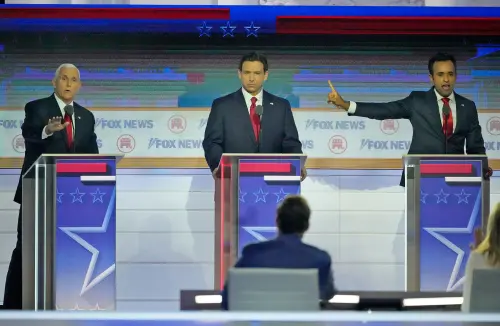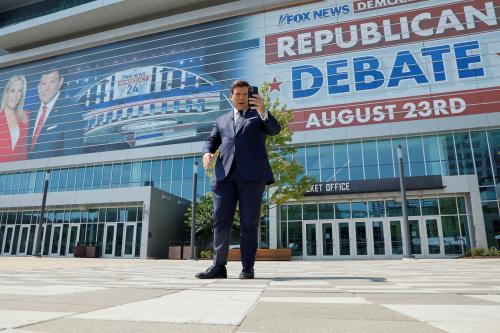I know, I know, it is a morbid question. Presidential candidates Trump and Biden are the oldest modern presidential candidates we’ve seen since Ronald Reagan ran for his second term. Donald Trump will be 78 on Inauguration Day 2025 and Joe Biden will have just turned 82. And even though my colleague Bill Galston and I have written about the fact that both men are most likely what the scientists call “superagers” and not at all likely to die or become incapacitated any time soon – the question is being asked by lots of people.
So here it goes.
The answer depends on when.
If a candidate dies or is incapacitated between now and New Year’s Day, there will be plenty of people in each party willing to jump into the nomination race. The problem will be filing deadlines — approximately 22 states have filing deadlines to get on the primary ballot between now and January 1, 2024. On the Republican side there will be many candidates who have filed — although Trump’s absence could prompt others to jump into the fray. And on the Democratic side there could be many late entries. In the event of something as dramatic as death or total incapacitation, state election officials (usually the secretary of state) may adjust filing deadlines to be able to get new entries onto the ballot in time for some of the spring primaries.
If the candidate dies or is incapacitated between New Year’s Day and mid-June 2024 some states might postpone their primaries and/or their filing deadlines (as they did in 2020 because of COVID-19) in order to give more time for newer candidates to get into the race. In states where that doesn’t happen, primary voters could vote for “uncommitted” but not all states include an “uncommitted” line on their ballots. Other voters could opt to write in candidates who are too late to get their names on the ballots. Some early long shot candidates who are already on the ballot might try and cut deals with more prominent candidates — i.e., a vote for Marianne Williamson is really a vote for Gov. Gavin Newsom — but that’s a tough message to convey.
If the candidate dies or is incapacitated between mid-June 2024 when the primaries are over and before the Wednesday night of the nominating convention (the traditional time for the roll call vote) the convention would become what conventions used to be before reforms made the primaries dominant (minus the smoke-filled rooms.) Delegates would arrive in Milwaukee (for the Republicans) or Chicago (for the Democrats) largely uncommitted. They would then engage in the arduous process of deciding who their nominee should be. Presidential hopefuls would go from state delegation to state delegation making their case as did Sen. John Kennedy and Sen. Lyndon Johnson as recently as the 1960 convention in Los Angeles. The Republicans may have to adopt a new rule at the beginning of their convention so that the dead man’s delegates would be free. The Democrats have a rule saying that delegates shall “in all good conscience” vote for the person they were elected to represent — so they would most likely not need a rules change.
If the Republican candidate dies or is incapacitated after the convention and before Election Day, the Republican National Committee (RNC) will meet to select a presidential candidate and/or vice-presidential candidate under Rule 9 of party rules.
Since every state has three RNC members and then some add-ons for Republican elected officials the states are not apportioned according to population — thus RNC members will cast the same number of votes as their state was entitled to cast at the convention and a new nominee will be selected by majority vote.
And yet, it is a reminder that the choice of a nominee is party business — not state law, not federal law, and not constitutional law.
The Democratic National Committee (DNC) is also authorized to select the party’s nominee in the event that the winner of the convention cannot run. This is spelled out in the charter of the Democrat Party. However, since DNC members are awarded to states according to the size of the states, there would be no adjustments.
This has actually happened only once before. After the 1972 convention, revelations came out that George McGovern’s running mate Sen. Tom Eagleton, had been treated for mental illness. Eagleton was forced to resign from the ticket and McGovern chose Sargent Shriver as his replacement. But McGovern alone could not place Shriver on the ticket with him, it needed to be ratified by the full DNC. And so, on August 9, 1972, the DNC chair, Jean Westwood, called the national committee into session to officially nominate Shriver as McGovern’s running mate.
The authority of the national parties to choose their nominee in the event the nominee can’t run comes as a surprise to many in this day of wall-to-wall primaries. And yet, it is a reminder that the choice of a nominee is party business — not state law, not federal law, and not constitutional law.
Both Democrats and Republicans have sets of rules governing the functioning of their national committees and the nomination of the president and the vice president. In most cases the Supreme Court has upheld the primacy of political parties under the First Amendment’s right of free association.
If the candidate dies or is incapacitated after Election Day, the Constitution kicks in. The first milestone will be the December 17, 2023, meetings of the electoral college. It may surprise many to know that the electoral college is composed of real flesh and blood electors who meet in their state capitols and sign documents (attestations) that are forwarded on to the president of the Senate (the vice president) for the purposes of counting only! We only hear about electors when someone decides to make a point and vote for someone whose slate they were not on. (During segregation some of these so-called “faithless electors” voted for segregationist candidates.1) Some states have laws binding electors to vote for the winner of the election, others do not. If the winner of the convention dies or is incapacitated it is likely that the legislature would quickly meet to amend the law so that their votes would count.
Finally, what if the president-elect dies or is incapacitated after the electoral college meets and before the inauguration? The authors of the 20th Amendment to the Constitution, the one adopted to provide for a way to pick a new vice president, thought of this. If the president-elect dies or is incapacitated the vice president is inaugurated. Section 3 of the 20th Amendment reads:
“If, at the time fixed for the beginning of the term of the President, the President elect shall have died, the Vice President elect shall become President.”
The long process of choosing a president begins with political parties — organizations that the Founding Fathers didn’t put into the Constitution because there were no party systems at the time, and they would have been surprised at the emergence of mass parties. But they were prescient in protecting the right of assembly and the right to petition the government under the First Amendment — rights carried out most often by political parties. Protected by the First Amendment, America’s two major political parties have evolved over the years. Today they each have a set of rules and procedures to take into account even the most dramatic and difficult scenarios.
-
Footnotes
- See Russ Wheeler’s piece at https://www.brookings.edu/articles/can-the-electoral-college-be-subverted-by-faithless-electors/







Commentary
What happens if a presidential candidate cannot take office due to death or incapacitation before January 2025?
September 7, 2023